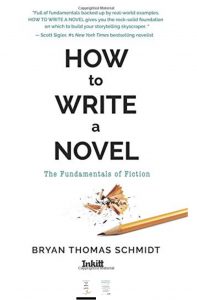 One of my pet peeves is when I hear fellow writers advise others writers that “writer’s block is a myth.” Having experienced writer’s block for myself, I find this condescending, and I’m not sure why those writers need to feel so superior to others by denying a problem so many have experienced. There’s nothing more frustrating than writing along making good progress until you reach that spot where for some reason, your mind just stops—blanks, or freezes, or whatever you want to call it—and you can’t seem to put words together to push on to the next scene. It’s a phenomenon most every writer has experienced, so calling it a myth feels dismissive and condescending. “Hey, you may be so lucky you’ve never had the problem, but I haven’t, and I don’t appreciate your denying it exists because that doesn’t help!”
One of my pet peeves is when I hear fellow writers advise others writers that “writer’s block is a myth.” Having experienced writer’s block for myself, I find this condescending, and I’m not sure why those writers need to feel so superior to others by denying a problem so many have experienced. There’s nothing more frustrating than writing along making good progress until you reach that spot where for some reason, your mind just stops—blanks, or freezes, or whatever you want to call it—and you can’t seem to put words together to push on to the next scene. It’s a phenomenon most every writer has experienced, so calling it a myth feels dismissive and condescending. “Hey, you may be so lucky you’ve never had the problem, but I haven’t, and I don’t appreciate your denying it exists because that doesn’t help!”
But here’s the thing: writer’s block is not a myth but it’s also not an excuse to stop writing.
“What?” You say. “But isn’t that the definition of Writer’s Block, that you can’t write?” Yes and no.
Writer’s Block is finding yourself stuck at a particular point in the story. Maybe a particular scene or line, maybe even mid-scene or mid-sentence. Try as you might, you can’t seem to get past it, and the problem seems to drag on hour after hour, sometimes even for several days.
The mistake many writers make is to let that keep them from writing, but that’s a mistake, and here’s why. Writer’s Block happens when there’s a problem in your story your subconscious knows about that your conscious self hasn’t realized yet. That’s right. Your subconscious is warning you the story isn’t working but you can’t see it because consciously you haven’t identified or recognized the problem yet. Usually it’s something you’ve already written that has a logic or other issue. Sometimes it can be what you are about to write next.
For linear writers, this is particularly frustrating because your normal pattern is to write scenes chronologically and not skip around. So when you get stuck on your next scene, the whole project comes to a halt. You literally feel like you can’t write until you get over the block so you can create the next scene in order like you’re supposed to. But I submit that this type of wrong thinking only exacerbates the problem.
The problem with this kind of thinking is that it gives you an excuse not to write. And every time you give yourself an excuse not to write—essentially violating your discipline and your commitment to productivity—you make it that much easier to use the same excuse the next time. So day after day of using Writer’s Block as an excuse not to write—“I can’t write. Writer’s Block.”—can allow the problem to stretch out even further.
Instead, I argue, you should work the problem. And here’s how.
First, look at your story. Go back and think through any scene or moment where you felt even a little uncertainty and ask yourself about it. What bothered you? Why was that troubling? Is it still bothering you? If so, that’s a spot you might want to look at. If not, then move on to the next one. In doing this, you will do things. One, you will stimulate your mind to think about story problems and reexamine your overall story subconsciously even as you look at each moment one by one. Two, you may uncover the very problem that’s causing the block, thus moving you that much closer to the possibility of a solution.
Second, write something else. Professional writers like myself often have multiple projects going on at once. When we’re writing one novel or story, we have another waiting to be rewritten or polished or edited. So switch to that for a while. Writing, rewriting, and editing take different brain space from each other, and just by shaking up what you are focused on and doing something else, the problem may reveal itself subconsciously and work its way out to your conscious mind. Relieving the building stress and frustration of being blocked is also one of the best ways to solve the block and resume writing. So anything you can do to keep writing and not feel stressed about productivity or progress is a win.
Now, I can’t write two novels at the same time, because juggling all the complex plots and characters is really too hard and tends to weaken both projects. But what I can do is do a rewrite on something else, edit something else yet again, and write a short story and/or screenplay while writing a novel, so I often have those other projects to choose from.
3. Write a different scene. Even if you don’t multitask, you can always find a scene ahead in the story that you’ve pictured in your mind with some clarity. So think through your story and identify such a scene then try writing it.
I know what you’re thinking. “But I am a linear writer, that’s not how I work.” Exactly! The point is to push through the block, so switching up how you do things is a great way to shake things up and free your mind to find the solution. So what if the scene you write out of order may need a little tweaking once you go back and write what leads up to it? Rewriting is part of the process anyway. You’ll be doing it one way or another at some point so no harm, no foul (to use a sports term). But in the process of writing past where you’re stuck, you may also discover a new angle or plot twist that opens up new possibilities you’d never thought of before that paves the way to solving the block problem. And just by becoming conscious of those possibilities, you allow your mind the freedom to work through the problem and find a solution. It happens to me all the time.
Again, while I strongly disagree with those who dismiss Writer’s Block as a myth, I also strongly disagree with those who use it as an excuse to stop writing. When you’re under contract, you’ll find that most of the time, not writing isn’t an option. Your deadline isn’t blocked. It’s not going to move. You still have to meet that to get paid. So writing something is a whole lot better than writing nothing because at least it’s progress. And if it has the bonus of freeing your mind from the block and allowing you to approach the story from a new timeframe and angle that illuminates the problem causing your block, then that’s even better! So find a scene you can write and write that. Trust me, even if you throw most of it out, you’ll feel better because the frustration and stress will be relieved, at least for the moment.
So there you have 3 Steps you can take to Work The Problem of Writer’s Block and push through to keep writing and being productive. Do you have other tips? We’d love to hear them in comments. Meanwhile, I hope this helps you. Happy writing!


 So there you have it, ten ideas on how to keep writing even through a pandemic or crisis. What works for you? What tips can you offer to help others like yourselves? We’d love to hear from you in comments.
So there you have it, ten ideas on how to keep writing even through a pandemic or crisis. What works for you? What tips can you offer to help others like yourselves? We’d love to hear from you in comments.

